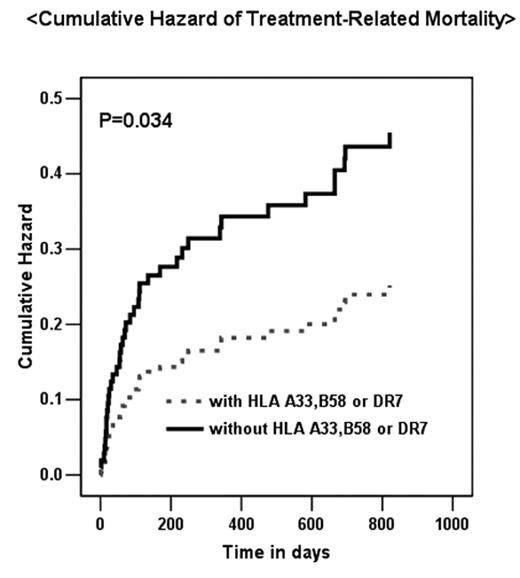Abstract
Human leukocyte antigens(HLA) are expected to influence outcomes or adverse effects in allogeneic hematopoietic stem cell transplantation through its immunologic function. However, the types of HLA and its mechanism to affect clinical outcomes are not well defined. In the other hand, heat shock protein 70-hom (HSP70-hom) plays an important role in protein folding and immune responses and was reported to influence the incidence of graft-versus-host disease after allogeneic hematopoietic stem cell transplantation. And it was also reported that HLA types were associated with polymorphisms of HSP70-hom in several diseases. So, we evaluated the association between HLA types and HSP70-hom polymorphisms and identified the specific HLA types to affect clinical outcomes in allogeneic hematopoietic stem cell transplantation. We analyzed the DNA of patients and donors who underwent allogeneic hematopoietic stem cell transplantation from HLA-matched sibling donors at single institute between 1998 and 2005 for malignancy or aplastic anemia. The HSP70-hom polymorphisms, rs2227956 and rs2075800, were genotyped and HLA typing was conducted in 141 patients and their donors. Individual haplotypes were estimated from genotype data of the two HSP70-hom polymorphisms using the expectation maximization algorithm. The HSP70-hom polymorphisms of patients were completely identical to those of their donors. Patients(101) with TG haplotype (TG/TA, TG/TG or TG/CG) did not only show less treatment-related mortality but also had longer overall survival compared with those(40) with non-TG haplotype (TA/TA or TA/CG). (P=0.011, P=0.013,respectively) TG haplotype was associated with HLA types of A33, B58 and DR7.(P<0.001, P=0.002, P=0.039, respectively) Patients with HLA types of A33, B58 or DR7 showed less treatment-related mortality compared with patients without the these HLA types in multivariate analyses with age, sex, transplant method, stem cell source and risk group.(P=0.034, HR=0.397, 95% CI: 0.169–0.931) In conclusion, HLA types of A33, B58 or DR7 in HLA-matched sibling hematopoietic stem cell transplantation were protective for treatment-related mortality in association with HSP70-hom polymorphisms.
Author notes
Disclosure: No relevant conflicts of interest to declare.


This feature is available to Subscribers Only
Sign In or Create an Account Close Modal